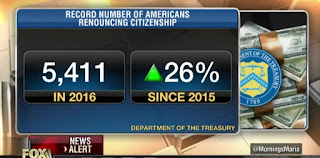-
Has the passage of ObamaCare made you think about leaving the country?
- Has the 2017 TCJA changes on international reporting, pushed you over the edge?
- Or maybe you are a naturalized U.S. citizen or permanent resident who has prospered here, but would now like to move back the old country for retirement?
Whatever your motives, just because you leave the United States and renounce your citizenship, don't assume you can leave U.S. taxes or filing or U.S. tax forms and its complexity behind.
If you expatriated on or after June 3, 2004, but before June 17, 2008, certain expatriation tax rules apply under Internal Revenue Code 877. If you are subject to expatriation tax, you must file a Form 1040NR (a U.S. Nonresident Alien Income Tax Return) for each year in the 10-year period following expatriation. The expatriation tax for these filers applies to U.S.-source gross income and gains on a net basis.
What if you leave now? For those who expatriate after June 16, 2008, the rules are different, since Internal Revenue Code Section 877A applies instead of Section 877. You are subject to an immediate exit tax, which deems you (for tax purposes) to have sold all of your worldwide property for its fair market value the day before your departure from the U.S.
 In 1994 a Forbescover story described how such wealthy Americans as Campbell Soup heir John (Ippy) Dorrance III, the late Carnival founder Ted Arison and Dart Container heir Kenneth Dart had given up their U.S. citizenship and avoided U.S. income or estate tax. Perhaps the most clever was Dart, who managed to come back "home" as the Belize ambassador to the U.S., manning a newly opened Belize embassy in Sarasota, Fla., right where he had previously lived! Since that time, Congress has repeatedly tightened the screws on tax-motivated expatriation and below are 10 things you need to know about expatriation:
In 1994 a Forbescover story described how such wealthy Americans as Campbell Soup heir John (Ippy) Dorrance III, the late Carnival founder Ted Arison and Dart Container heir Kenneth Dart had given up their U.S. citizenship and avoided U.S. income or estate tax. Perhaps the most clever was Dart, who managed to come back "home" as the Belize ambassador to the U.S., manning a newly opened Belize embassy in Sarasota, Fla., right where he had previously lived! Since that time, Congress has repeatedly tightened the screws on tax-motivated expatriation and below are 10 things you need to know about expatriation:
1. Expatriating Means Really Leaving.
To even think about putting himself beyond the reach of the Internal Revenue Service, a citizen must give up U.S. citizenship and (in the case of citizens subject to Internal Revenue Code Section 877) severely limit the time spend in the U.S. to not more than 30 days a year. Under that section, a person who attempts to renounce U.S. citizenship but then spends more than 30 days a year in the U.S. will be treated as a U.S. citizen or resident for that year. You may think no one has ever done this, but many have. Permanent U.S. residents (holding green cards) also pay U.S. tax on their worldwide income. They may find it easier to take the expatriation plunge, particularly if family or business opportunities beckon in their country of origin.
2. Tax Avoidance is Now Irrelevant.
In 2004 (in the American Jobs Creation Act), Congress threw out the tax avoidance motive test altogether, imposing 10 years of U.S. tax on U.S. source gross income and gains on a net basis if you left the country for any reason. However, Congress increased the threshold for determining who was subject to this expatriation tax. An individual was only subject to the expatriation tax if he had an average net annual income tax for the five years preceding expatriation of $124,000, or if he had a net worth of $2 million or more on the date of expatriation. If you expatriated on or after June 17, 2008, under the new Section 877A, there is a higher net worth threshold, currently $145,000 of annual net income tax for 2010.
In some cases, even if you're below these thresholds, you'll get taxed. For example, expatriates must certify their past U.S. tax compliance by filing an IRS Form 8854. Any expatriate who fails to certify compliance with U.S. federal income tax laws for the five taxable years preceding expatriating is subject to the expatriate income tax even if he didn't meet the income tax liability or net worth tests.
Plus, later U.S. visits can be expensive if you expatriated before June 17, 2008 (and Internal Revenue Code Section 877 applies). In that case if an expatriate comes back to the U.S. for more than 30 days in any year during the 10 years following expatriation, that person is considered a resident of the U.S. for that whole tax year. That means the person would again be subject to U.S. tax on his worldwide income, not just his U.S.-source income.
This 30-day rule does, however, have an exception for any days (up to a 30-day limit) that the individual performed personal services in the U.S. for an employer (who is not related). This exception only applies if that individual either had certain ties with other countries or was physically present in the U.S. for 30 days or less for each year in the 10-year period on the date of expatriation or termination of residency.
3. There are Special Rules for Long-Term Residents.
It's easy to define who is or is not a U.S. citizen, but the term "long-term resident" isn't quite so clear. A long-term resident is a non-U.S. citizen who is a lawful permanent resident of the U.S. in at least eight years during the 15-year period before that person's residency ends. A "lawful permanent resident" means a green card holder. However, a person is not treated as a lawful permanent resident for purposes of this eight-year test in a year in which that person is treated as a resident of a foreign country under a tax treaty, and does not waive the treaty benefits applicable to the residents of that country. Caution: holding a green card for even one day during a year will taint the whole year.
4. There's an Exit Tax for Expatriations on or after June 17, 2008.
If you are a U.S. citizen or long-term resident who expatriates on or after June 17, 2008, you will be deemed (for tax purposes) to have sold all of your worldwide property for its fair market value the day before you leave the U.S. All that gain is subject to U.S. tax at the capital gains rate. Plus, all your gain is taken into account without regard to any other tax provisions in the Internal Revenue Code.
Put differently, you get all of the bad parts of the tax code, and none of the good. That would include, for example, the inability to benefit from the $250,000 per person ($500,000 per couple) exclusion from gain on a principal residence (Section 121 of the Internal Revenue Code) and many other rules.
The exit tax is like an estate tax, in the sense that everything that would be part of your estate will be subject to income tax on unrealized gains as of the day before you expatriate, as if you sold all your assets the day before leaving. In effect this is Congress' way of making sure your assets don't escape the estate tax entirely through expatriation.
5. Some Expatriates Can Escape the Exit Tax.
In general the exit tax is unforgiving and has broad application. Yet if you have less than $600,000 of income from the deemed sale of your assets on expatriation, you pay no tax. This exemption amount is adjusted for inflation and is $627,000 for 2010. If your gain exceeds this amount, you must allocate the gain pro rata among all appreciated property.
However, this exclusion amount must be allocated to each item of property with built-in gain on a proportional basis. This involves a complicated process of multiplying the exclusion amount by the ratio of the built-in gain for each gain asset over the total built-in gain of all gain assets. The exclusion amount allocated to each gain asset may not exceed the amount of that asset's built-in gain.
Moreover, if the total allowable gain of all gain assets is less than the exclusion amount, the exclusion amount that can be allocated to the gain assets will be limited to that amount of gain. For example, in 2010, if the total allowable gain in an expatriate's assets was $500,000, then that $500,000 would be the limit instead of $627,000.
Fortunately not all expatriates face the exit tax; only "covered expatriates" do. Under prior law, you generally had to give notice you were expatriating to trigger the rules. Now if you relinquish your passport or green card, it's generally automatic. But some expatriates, even under the new law, can escape the exit tax. The financial thresholds can still exempt you. Some people born with dual citizenship who haven't had a substantial presence in the U.S. and certain minors who expatriated before the age of 18-and-a-half are also exempt. However, those people must still file an IRS Form 8854 Expatriation Information Statement.
6. You Can Elect to Defer the Exit Tax.
If you do face the exit tax, you can make an irrevocable election (on a property-by-property basis) to defer it until you actually sell the property. This election allows people to leave the U.S. and expatriate without triggering immediate tax as long as the IRS is assured it will collect the tax in the future.
To qualify, a covered expatriate must provide a bond or other adequate security for the tax liability. There are specific requirements for these security bonds. Plus, there is an updating and monitoring of the bond in case it becomes inadequate to cover the tax. The IRS scrutinizes these elections on a case-by-case basis, so hire an expert. There are detailed requirements for filing the deferral election, including documentation, and copies of various documents.
One of these requirements is appointing a U.S. agent for the limited purpose of accepting communications with the IRS. Plus, the taxpayer must waive any tax treaty benefits that might otherwise impact the IRS getting its money. It doesn't appear that many of these deferral elections have been made so far.
There's another reason, other than the bond, not to defer. When you do sell, you'll pay taxes at the rate then in effect, which may be higher.
7. You Will Need Professional Help.
As you might expect, there are forms to file and procedures to follow if you expatriate. In fact, if you are wavering, the paperwork alone may keep you stateside.
You must file IRS Form 8854 and in some cases you must file it for 10 years. Additional special forms (Form W-8CE if you have any deferred compensation items, a specified tax deferred account, certain non-grantor trusts, etc.) are also required.
Gone Are The Days When The Taxpayer Could Renounce U.S. Citizenship and Stand A Good Chance Of Avoiding U.S. Tax!
Since this discussion barely scratches the surface of the various issues associated with expatriation, you should obtain the advice of a Tax Attorney who has experience in expatriation tax issues.
Should I Stay or Should I Go?
Need Advise on Expatriation …
Contact the Tax Lawyers of
Marini & Associates, P.A.
Forbes














